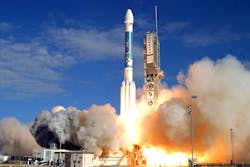Air Force trusted computing experts look to digital twins to foil cyber attack on GPS satellite constellation
EL SEGUNDO, Calif. – Faced with a congressional mandate to test its GPS system for cyber vulnerabilities, the Air Force commissioned a digital replica of the satellites and then asked contractors to launch a cyber attack on the system. Air Force magazine reports. Continue reading original article
The Military & Aerospace Electronics take:
26 March 2020 -- The use of “digital twins” is expanding from modelling in conventional simulators to include trusted computing testing of emerging technologies and systems, predicting engine performance, or training automated systems to fly a plane.
With GPS, Booz Allen Hamilton Inc. in McLean, Va., built the SatSim twin for the Lockheed Martin Corp. Block IIR GPS satellite for the Air Force Space and Missile Systems Center (SMC), in El Segundo, Calif.
That enabled trusted-computing vulnerability scans and penetration tests across the whole GPS system -- including the satellite, ground control stations, and the radio-frequency links between them. Booz Allen then could conduct “man-in-the-middle” attacks on the communication links to identify potential weaknesses between the satellite and its ground control station.
Related: Air Force asks Raytheon to provide trusted computing to GPS with secure ASIC components
John Keller, chief editor
Military & Aerospace Electronics
